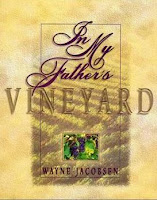 |
| (Amazon UK link) |
I decided, rather than putting it on my wishlist, I would buy a very inexpensive version advertised in the ‘Marketplace’, and have it delivered to relatives on a recent UK trip.
I knew that ‘In my Father’s Vineyard’ would be hardback, but had not taken note of the number of pages (just over 100). In addition, I had not realised that it was a larger size book than normal: the design made it feel like a gift book. My second-hand copy was in pristine condition, and I quickly realised that it’s written in the style of a devotional: short chapters, each one looking at a brief passage of Scripture, with some relevant thoughts.
While it wasn’t what I was expecting (I suppose I should have read the reviews more carefully!) I quickly found myself liking it very much. The main focus is John chapter 15, which starts, ‘I am the vine…’, using the analogy of a vineyard and vine-grower as one for Christian growth and increasing maturity. The author recounts his own childhood, where his earthly father was indeed a vineyard owner, so he writes from extensive experience about vines and vine-growing, something which would have been familiar to Jesus’ listeners in the 1st century, but about which most of us in the western world know very little.
Each chapter is two or three pages long, with a brief passage of Scripture (not all from John 15) at the side, and some thoughts about both vine-growing and the Christian life. The commentary is often thought-provoking, and the insights into the life of a vineyard owner very interesting too.
The book is divided into broad sections reflecting the four seasons, explaining how each period of the year has a specific purpose in the life of the vine, including the ‘rest’ period over the winter when there is no obvious growth, and where the vines have to be protected from winter storms.
I learned about pruning: why it must be done, and when it has to be done if it’s not to destroy the entire vine. I learned about the importance of waiting for the right time to harvest the fruit, too. And I was reminded that the ‘fruit’ we grow in our own lives is not so much our work, but those of love, joy, peace and so on, as outlined in Galatians 5.
I read a chapter - or sometimes two - over the course of a few weeks, and liked it very much. There are 29 chapters in all, so it’s ideal as a month’s devotional reading. I’m sure I’ll pick it up again some time, and in the meantime would recommend it to anyone who would like to know more about vine-growing, and also about how the analogy can be used in relation to the Christian life.
Recommended to any believers who would like to dig a bit further into this well-known passage, and perhaps gain a different perspective.
Review copyright 2016 Sue's Book Reviews
I knew that ‘In my Father’s Vineyard’ would be hardback, but had not taken note of the number of pages (just over 100). In addition, I had not realised that it was a larger size book than normal: the design made it feel like a gift book. My second-hand copy was in pristine condition, and I quickly realised that it’s written in the style of a devotional: short chapters, each one looking at a brief passage of Scripture, with some relevant thoughts.
While it wasn’t what I was expecting (I suppose I should have read the reviews more carefully!) I quickly found myself liking it very much. The main focus is John chapter 15, which starts, ‘I am the vine…’, using the analogy of a vineyard and vine-grower as one for Christian growth and increasing maturity. The author recounts his own childhood, where his earthly father was indeed a vineyard owner, so he writes from extensive experience about vines and vine-growing, something which would have been familiar to Jesus’ listeners in the 1st century, but about which most of us in the western world know very little.
Each chapter is two or three pages long, with a brief passage of Scripture (not all from John 15) at the side, and some thoughts about both vine-growing and the Christian life. The commentary is often thought-provoking, and the insights into the life of a vineyard owner very interesting too.
The book is divided into broad sections reflecting the four seasons, explaining how each period of the year has a specific purpose in the life of the vine, including the ‘rest’ period over the winter when there is no obvious growth, and where the vines have to be protected from winter storms.
I learned about pruning: why it must be done, and when it has to be done if it’s not to destroy the entire vine. I learned about the importance of waiting for the right time to harvest the fruit, too. And I was reminded that the ‘fruit’ we grow in our own lives is not so much our work, but those of love, joy, peace and so on, as outlined in Galatians 5.
I read a chapter - or sometimes two - over the course of a few weeks, and liked it very much. There are 29 chapters in all, so it’s ideal as a month’s devotional reading. I’m sure I’ll pick it up again some time, and in the meantime would recommend it to anyone who would like to know more about vine-growing, and also about how the analogy can be used in relation to the Christian life.
Recommended to any believers who would like to dig a bit further into this well-known passage, and perhaps gain a different perspective.
Review copyright 2016 Sue's Book Reviews
No comments:
Post a Comment